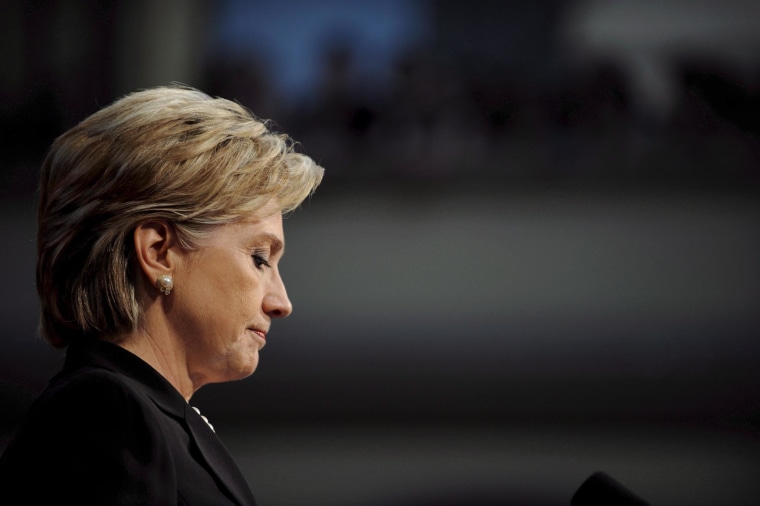Hillary Clinton faces doubts from two different parts of the Democratic Party about her likely presidential run, even as she remains the overwhelming favorite to win the party’s nomination.
A camp of liberals, particularly those aligned with Massachusetts Sen. Elizabeth Warren, are worried Clinton will be unwilling to embrace some progressive ideas, like increasing Social Security benefits and breaking up large banks. Another group of Democrats, particularly strong backers of President Barack Obama during the 2008 primaries, say they are worried about the perception that Clinton’s potential candidacy has become too much about achieving her long-sought goal of being elected president rather than her vision for leading the country.
"The moment Hillary announces, she has our nomination, and that’s okay with me"
In interviews with 20 key Democratic activists, elected officials and state party leaders from across the country, there was almost uniform agreement that Clinton will be the party’s nominee and that her campaign should be centered on making the economy work better for middle and low-income Americans. But party officials disagree both about what exact policies Clinton should advance and if she will be effective in advocating them.
“The thing that went wrong in 2007 was that the campaign got ahead of the rationale for it, and it became more about her than the country,” said David Axelrod, Obama’s former chief strategist. “I don’t think she will make that mistake again, but there’s the danger of that. She’s been portrayed as the inevitable candidate and that’s a trap. She has to scuffle through this every day.”
Maria Teresa Kumar, who is president of Voto Latino, said party activists will press Clinton on her ties to Wall Street.
“We know where she is on women’s issues, we know what she has said on immigration, the environment,” said Kumar. “I think the challenge will be where is she when it comes to Wall Street. She and her husband are close to them through CGI [The Clinton Global Initiative.] Can she be tough on them? Can she close tax loopholes?”
For now, these doubts don’t seem to pose a major threat to Clinton’s path to the Democratic nomination. With Warren insisting that she won’t run, other potential competitors – like former Virginia Sen. Jim Webb and former Maryland governor Martin O’Malley – lack Clinton’s ability to raise money and lock down influential endorsements.
And if she does win the nomination, factors such as the state of the economy and Obama’s approval rating next November, neither of which Clinton has much control over, may be as important as any of her campaign tactics in determining the winner of the general election.
“The moment Hillary announces, she has our nomination, and that’s okay with me,” Kentucky Gov. Steve Beshear said in an interview. “She’s our strongest candidate.”
But the concerns about her candidacy illustrate the internal tensions between the Democratic Party’s progressive and pragmatic poles.
The left wing of the Democratic Party is trying to push Clinton towards a more confrontational populism. Richard Trumka, the head of the AFL-CIO, has been publicly urging Democratic leaders to stop relying on alumni of Wall Street firms to shape their proposals to boost the economy. That’s an implicit critique of both Obama and Clinton, who have both been advised by former and current executives at banks like Citigroup.
“Hillary will need to be very careful not to be seen to be running, or even walking, away from President Obama.”
Part of Clinton’s legacy as a more pro-business Democrat also stems from her husband’s refrain during his own presidency that “the era of big government is over.”
But that approach may not work for the former secretary of state, as the party’s activists increasingly want Democrats to stand against some big businesses and offer a strong defense of the role of government.
“The biggest question is will she rise to this economic populism moment really focused on big ideas, as opposed to no ideas, small ideas or lip service to big ideas,” said Adam Green, co-founder of the Progressive Change Campaign Committee, which strongly backed Warren's 2012 Senate campaign. “Elizabeth Warren’s call to break up the big banks, expanding Social Security benefits instead of cutting them and something big on creating jobs and making college more affordable, these are bread and butter ideas that affect people’s lives.”
John Nichols, a progressive writer for The Nation magazine, said that Clinton’s campaign “cannot be about nostalgia for the 1990’s or even continuity with the Obama presidency.”
“The Democrats have failed when it comes to developing and advancing a coherent vision for where the economy must go in an era of rapid technological development," Nichols added, saying Clinton should offer a “a vision of a humane and functional economic future.”

Those allied with Obama in 2008 are wary of the former secretary of state breaking from the president simply for political gain.
“Hillary will need to be very careful not to be seen to be running, or even walking, away from President Obama,” said Joy-Ann Reid, who worked on Obama’s 2008 campaign in Florida and is now host of a tv show on MSNBC. “Democrats in 2014 tried that tack, and we all see where it got them. Black voters and white Obama Democrats will look for any signal that Hillary Clinton is attempting to extricate herself from the Obama legacy.”